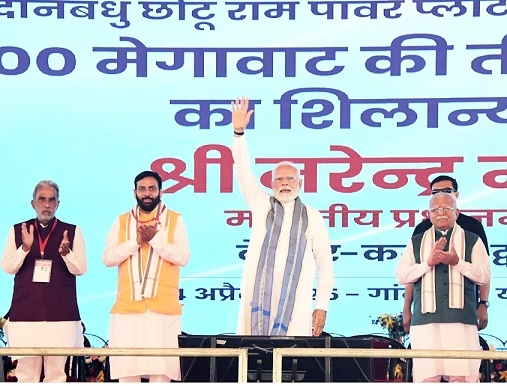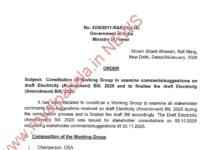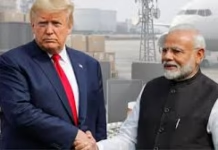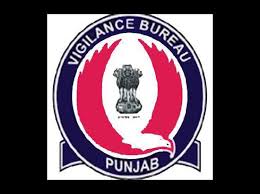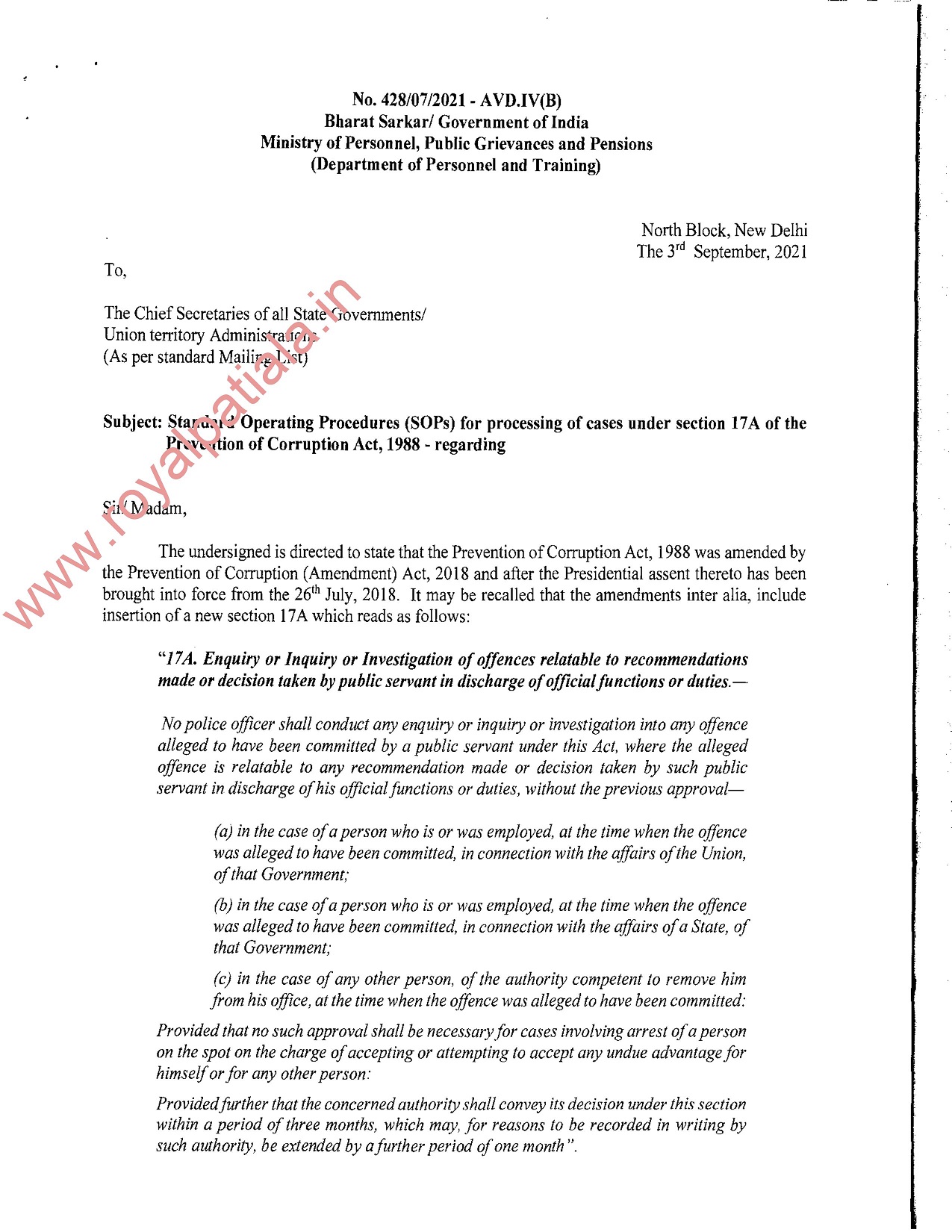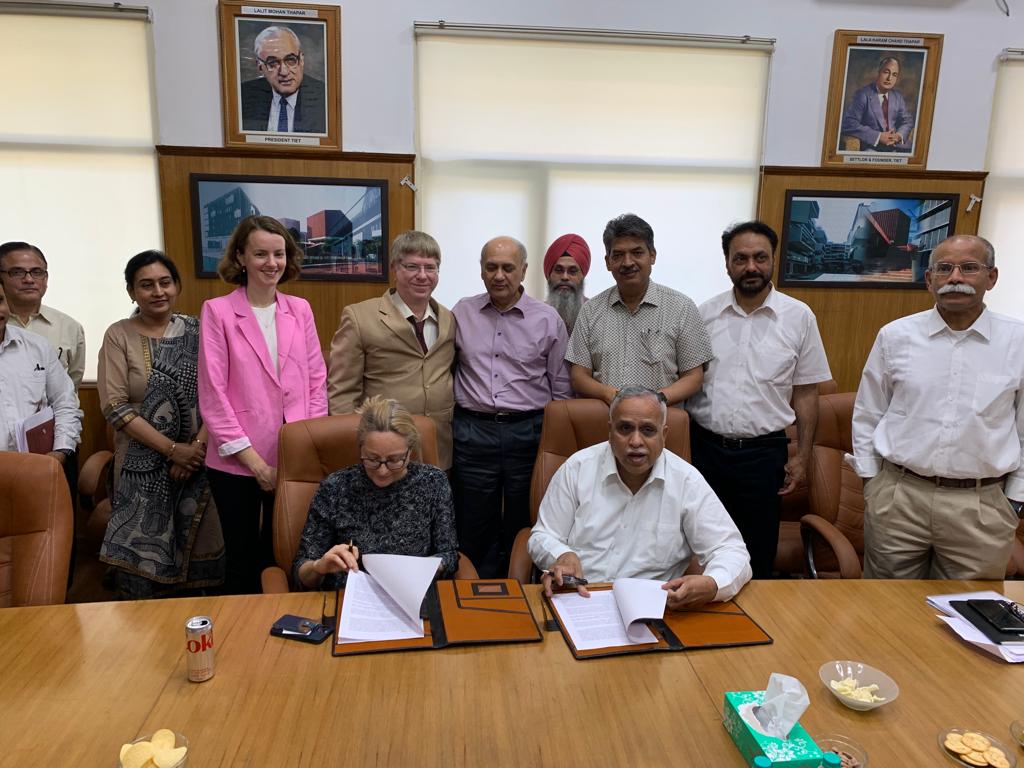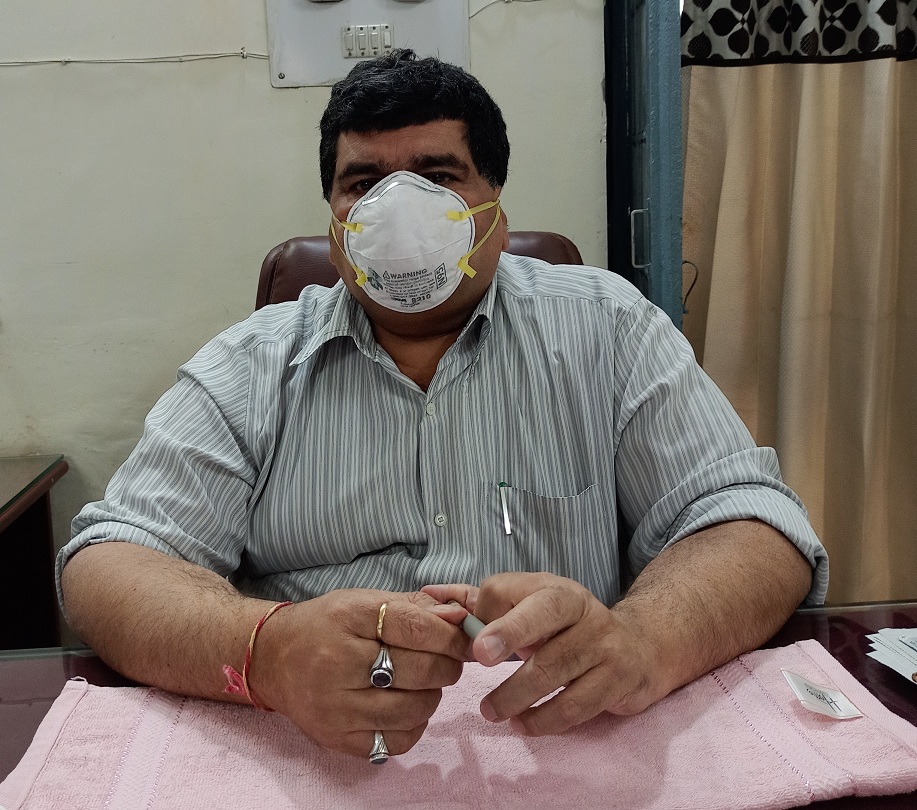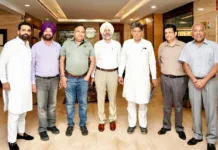Our effort is to increase the production of electricity in the country; lack of electricity should not become an obstacle in nation building: PM
Kanwar Inder Singh/ royalpatiala.in News/ April 14,2025
The Prime Minister, Narendra Modi said that Viksit Haryana for Viksit Bharat, is our resolve and he highlighted the government’s dedication to serving the people of Haryana and fulfilling the aspirations of its youth by working at greater speed and scale. The double engine government is continuously working to empower the four pillars – Poor, Farmers, Youth and Women and with the efforts of all of us, Haryana will definitely develop. My best wishes are that Haryana will prosper and bring glory to the country.
The Prime Minister was addressing the gathering after inaugurating and laying the foundation stone of development projects at the Viksit Bharat-Viksit Haryana programme organized in Yamunanagar on Monday. Haryana Chief Minister, Nayab Singh Saini, Union Power Minister, Manohar Lal, Union Minister of State for Statistics and Programme Implementation Rao Indrajit Singh, Union Minister of State for Cooperation, Krishan Pal, Haryana Cabinet Ministers, Anil Vij, Krishan Lal Panwar and Shyam Singh Rana were also present on this occasion.
Extending his greetings to the people of Haryana, the Prime Minister paid homage to the sacred land of Haryana, acknowledging it as the origin of Maa Saraswati, the site of Panchmukhi Hanuman Ji, and the blessed Kapalmochan. Hi said that Haryana is a confluence of culture, devotion, and dedication. He also conveyed his heartfelt wishes to all citizens on the 135th birth anniversary of Babasaheb Ambedkar, highlighting Babasaheb’s vision and inspiration, which continue to guide India’s journey toward development.
Narendra Modi said that Yamunanagar is not just a city but a vital part of India’s industrial landscape, contributing significantly to the economy with its industries ranging from plywood to brass and steel. He highlighted the cultural and historical significance of the region, mentioning the Kapal Mochan Mela, the sacred land of Rishi Ved Vyas, and the site of Guru Gobind Singh Ji’s weaponry.
He shared his personal connection with Yamunanagar, recalling his frequent visits from Panchkula during his tenure as Haryana’s in-charge. He expressed gratitude for the dedicated workers he collaborated with and acknowledged the enduring tradition of hard work and commitment in the region.
The hard work of Haryana’s farmers contributes to every Indian’s plate
Praising the hard work of Haryana’s farmers, which contributes to every Indian’s plate, the Prime Minister emphasized that the governments at Center and state stands as a steadfast partner in the joys and challenges of farmers. He highlighted efforts to empower Haryana’s farmers, noting that the state government now procures 24 crops at MSP. He shared that lakhs of farmers in Haryana have benefited from the PM Fasal Bima Yojana, with claims exceeding Rs. 9,000 crore under the scheme. Additionally, he mentioned that Rs 6,500 crore has been disbursed to Haryana’s farmers through the PM Kisan Samman Nidhi, further supporting their livelihoods and growth.
Underlining the Haryana government’s decision to abolish the colonial-era water tax, relieving farmers from paying taxes on canal water, Narendra Modi said that that over ₹130 crore in outstanding dues under this tax have also been waived. He emphasized the efforts of the Union and state government in providing new income opportunities for farmers and livestock owners. He said that the Gobardhan Yojana, which enables farmers to manage waste and generate income by producing biogas from cow dung, agricultural residues, and other organic waste. He said that this year’s budget includes the announcement of 500 Gobardhan plants across the country. He highlighted the foundation stone laying of a new Gobardhan plant in Yamunanagar, which will save Rs 3 crore annually for the municipal corporation. “Gobardhan Yojana is also contributing to the Swachh Bharat Abhiyan, furthering the mission of cleanliness and sustainability.
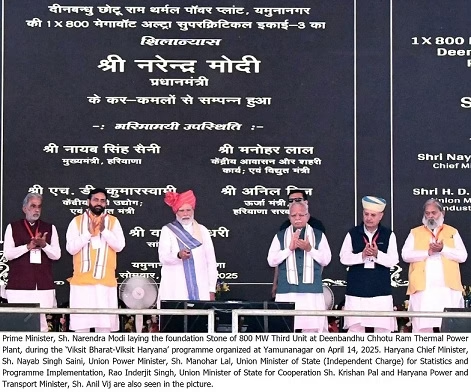
People are being betrayed in Congress ruled states, for BJP, politics is not a means to enjoy power, but a medium to serve the people and the nation
The Prime Minister said that for us, politics is a medium of service to the people and the nation. He said that our party delivers on its promises, as evident in Haryana, where the government is fulfilling commitments made after being elected for the third term. He contrasted this with opposition-ruled states, citing betrayal of public trust. He pointed to the struggles faced by people in Himachal Pradesh, where development and welfare projects have stalled. In Karnataka, he highlighted rising costs of essentials like electricity, milk, bus fares, and seeds under current dispensation’s rule. He mentioned public dissatisfaction with the incumbent government in Karnataka, as seen on social media, and noted allegations of corruption, with even close associates of the Chief Minister acknowledging Karnataka’s ranking as number one in corruption.
Narendra Modi criticized the present government in Telangana for neglecting its promises to the people and focusing on bulldozing forests, causing harm to nature and wildlife. He contrasted two models of governance and described his party’s model as genuine and dedicated to building a developed India, while the opposition’s as deceitful and focused solely on power. He highlighted the ongoing efforts in Yamunanagar as an example of his party’s commitment to progress.
Unlike the Congress frequent blackouts era, We have incresed the power generation twofold
Underlining the critical role of electricity in building a developed India, the Prime Minister said that the government’s multifaceted efforts to enhance power availability, including initiatives like One Nation-One Grid, new coal power plants, solar energy projects, and the expansion of the nuclear sector. “Increasing electricity production is essential to ensure that power shortages do not hinder nation-building”, he stressed recalling the frequent blackouts before 2014 under previous dispensation’s rule, stating that such crises would have persisted if Congress had remained in power. He said that during those times, factories, railways, and irrigation systems were severely affected. He shared that over the past decade, India has nearly doubled its electricity production capacity and now exports power to neighboring countries.
Highlighting the government’s dual approach of investing in thermal power plants while empowering citizens to become power generators themselves, Narendra Modi said the launch of the PM Suryagarh Muft Bijli Yojana, enabling individuals to install solar panels on their rooftops, eliminate electricity bills, and even earn by selling surplus power. He said that over 1.25 crore people across the country have registered under this scheme, with lakhs from Haryana applying to join. He expressed satisfaction with the scheme’s expansion, which is fostering a growing service ecosystem. He emphasized that the solar sector is creating new skills, generating opportunities for MSMEs, and opening numerous avenues for youth employment.
Prime Minister underscored the government’s focus on ensuring adequate electricity and financial resources for small industries in smaller towns. He mentioned that during the COVID-19 pandemic, the government provided financial assistance worth lakhs of crores to support MSMEs. He further said that the definition of MSMEs has been revised to allow small industries to expand without fear of losing government support as they grow, while mentioning the introduction of special credit cards for small industries and an increase in credit guarantee coverage. He noted the recent 10-year milestone of the Mudra Yojana, under which Rs. 33 lakh crore in collateral-free loans have been disbursed. He emphasized that over 50% of the beneficiaries of this scheme are from SC, ST, and OBC families. He expressed the government’s commitment to enabling small industries to fulfill the big dreams of India’s youth.
The essence of ‘Make in India’ and ‘Aatmanirbhar Bharat’ lies in fostering manufacturing, as reflected in this year’s budget announcement of ‘Mission Manufacturing’
Expressing pride in his government’s commitment to advancing the vision of Babasaheb Ambedkar, Narendra Modi highlighted Babasaheb’s belief that industrial development was a pathway to social justice. He said that Babasaheb identified the issue of small landholdings in India and emphasized that Dalits, lacking sufficient agricultural land, would benefit the most from industrialization. He shared Babasaheb’s vision that industries would provide greater employment opportunities for Dalits, improving their standard of living. He also acknowledged Babasaheb’s significant role in India’s industrialization efforts, working alongside the country’s first Industry Minister, Dr. Syama Prasad Mukherjee, to drive progress in this direction.
Remarking that the synergy between industrialization and manufacturing was also recognized by Deenbandhu Chaudhary Chhotu Ram Ji as the foundation for rural prosperity, the Prime Minister highlighted Chhotu Ram Ji’s belief that true prosperity in villages would come when farmers enhance their income through small industries alongside agriculture. He further noted that Chaudhary Charan Singh Ji, who dedicated his life to the welfare of villages and farmers, shared a similar vision, emphasizing Charan Singh Ji’s perspective that industrial development should complement agriculture, as both are pillars of the economy.
Emphasising that the essence of ‘Make in India’ and ‘Aatmanirbhar Bharat’ lies in fostering manufacturing, Narendra Modi underscored the government’s focus on manufacturing, as reflected in this year’s budget announcement of ‘Mission Manufacturing’. “The mission aims to create maximum employment opportunities for Dalit, backward, underprivileged, and marginalized youth, provide them with essential training, reduce business costs, strengthen the MSME sector, equip industries with modern technology, and ensure Indian products are world-class”, he stated. Underscoring the importance of uninterrupted power supply to achieve these goals and highlighting the significance of today’s event, he announced the commencement of work on the third unit of the Deenbandhu Chaudhary Chhotu Ram Thermal Power Plant, which will benefit Yamunanagar and Haryana. The Prime Minister noted that Yamunanagar produces half of India’s plywood and is a hub for manufacturing aluminum, copper, and brass utensils. He added that petrochemical plant equipment from Yamunanagar is exported to several countries. He emphasized that increased power production will benefit these industries and support ‘Mission Manufacturing’.
Shankaran Nair’s actions as a remarkable example of Ek Bharat, Shreshtha Bharat
Reflecting on the significance of Baisakhi and the 106th anniversary of the Jallianwala Bagh massacre, the Prime Minister honored the memory of the patriots who sacrificed their lives and highlighted the cruelty of the British regime. He emphasized another aspect of the massacre—the unwavering spirit of standing for humanity and the nation, exemplified by Shankaran Nair. He further shared that Shankaran Nair, a renowned lawyer and high-ranking official in the British government, chose to resign and raise his voice against the atrocities of foreign rule. He fought the Jallianwala Bagh case single-handedly, shaking the foundations of the British Empire and holding it accountable in court. He described Shankaran Nair’s actions as a remarkable example of “Ek Bharat, Shreshtha Bharat,” showcasing how a man from Kerala stood against British power for a massacre in Punjab. He remarked that this spirit of unity and resistance was the true inspiration behind India’s freedom struggle and remains a driving force in the journey toward a developed India.
The Prime Minister concluded by urging everyone to learn about Shankaran Nair’s contributions and emphasized the Union and state governments continuous efforts to empower the pillars of society—poor, farmers, youth, and women.
Members of Parliament, Naveen Jindal, Rekha Sharma, Ram Chander Jangra, Kartik Sharma and other dignitaries also remained present on this occasion.

